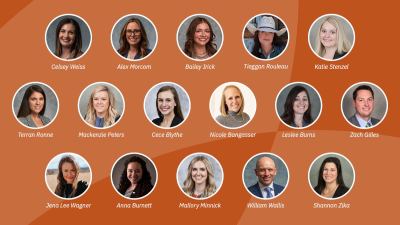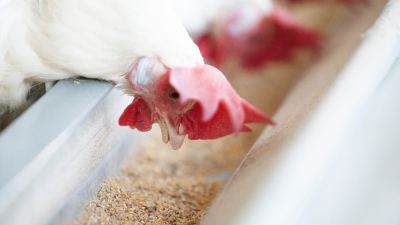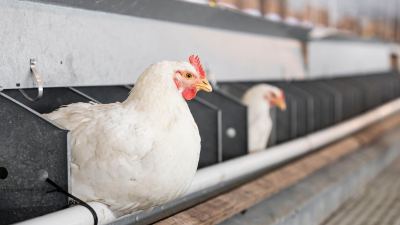Laura Daniels: A voice for ag

As the dairy industry works to overcome consumer perceptions and find new markets, can farmers take matters into their own hands and become a voice for agriculture?
The following is an edited transcript of Nicole Erwin's interview with Laura Daniels, president and founder of Dairy Girl Network. Click below to hear the full interview:
Nicole: Dairy farming has changed considerably in the last 20 years, but the consumer view of the industry has not adjusted as quickly. I'm talking with Laura Daniels, president and founder of Dairy Girl Network. She is also a mother, wife, farmer, dairy consultant and agriculture advocate. Laura, thank you for joining us.
Laura: I'm really glad to be here.
Nicole: How do you balance all of these roles?
Laura: I don't really believe in balance. I believe in giving your all to what you're doing right now and then switching gears and focusing on what you need to focus on next. I think it's a misnomer to think that we can put all of those different parts of our lives into neat little balanced bits. It doesn't work that way in my world. That’s how I balance: I just don't!
Nicole: You just do!
Laura: Yeah, that's right.
Nicole: It is no secret that the dairy industry in the U.S. is in a crisis, along with other struggling markets in Europe and elsewhere. The National Family Farm Coalition, along with dozens of others, are calling for significant changes to the current system, from advocating for new markets to asking for price controls and even a quota-based system. Laura, what role does the consumer play in helping to move this industry forward and verbalizing the needs on the farm?
Laura: I think that the consumer has been contributing to this conversation all along. Sometimes, I think we forget to recognize the part that they have played and will continue to play. Consumers want something specific from farmers — dairy farmers, crop farmers — depending on what they produce. It's our job to segment that market. If someone wants to buy organic milk, we should produce it. If someone wants to buy a grass-fed milk, I believe we should produce it. If someone wants to have confidence that the milk they buy is healthy and it came from a family farm but it's cheap and they can feed their family for a good price, we should give that to the consumer.
I think that the consumer has been entering into this conversation for a long time, and it might be the dairy industry that's behind when it comes to responding to this. We have to remain nimble — we have to be able to identify new markets and fill them quickly. This is something we haven’t always been good at, but we have to get better because the consumer is going to continue to make, not demands, but requests — and I really think that's what they are; they’re requests. The sooner we fill that need, the more milk is going to be sold in the U.S. and worldwide.
Nicole: When did you realize that you had a voice that could be heard, and what message motivated you to get started as an “agvocate?”
Laura: I feel like I found my voice probably when I was in college. I was active with a lot of leadership responsibilities. But the first time I really stepped up as an agvocate — or maybe even an activist, depending on how you use that term — would have been when author Michael Pollan came to the campus at the University of Wisconsin-Madison, which is my alma mater, and gave a free speech. There was a statewide book club about one of his books. I really felt like the full story wasn't being told. I agreed with a lot of what Pollan said, but I most certainly disagreed with part of it. I felt like my story as a farmer was left out of his pages. So, I gathered a lot of other farmers who I thought were also left out and mobilized them. We had a huge impact on the discussion in Wisconsin. That was the first time that I really found my voice and realized I could use it.
Nicole: Do you think that your direct connection to the farm provides more credibility in a time when consumers are looking for that transparency or that missing piece?
Laura: Absolutely. There is just no question about that. It’s important that whoever makes the decisions on the farm be the one who shares the reasons why they have made those decisions. For example, if it’s someone on a farm who's responsible for animal care, if they're the decision-maker, they are the most compelling person to tell the story. Sometimes that's the leadership of the farm, but it can also be the people who are side-by-side with the animals making those decisions day to day. But the decision-making, in my mind, is what makes someone incredibly compelling.
Nicole: What are you seeing happening in dairy and around your own farm, and how does the dairy market today compare to 2014, when it was doing really well?
Laura: Farmers — dairy farmers, all farmers — are these incredibly resilient people. I see my neighbors digging deep, doing a lot of research, figuring out if continuing to be a farmer is what's right for them and their families. In dairy right now, there are a lot of really honest conversations — hard conversations — happening at kitchen tables across the Midwest and across the nation, and I'm sad about that. The answer to that needs to come from so many directions, and every little bit helps.
My hope is that we don't lose some of the farmers who are uniquely positioned to meet those requests from the consumers. Right now, that is something I'm very worried about. The young farmers — the people who are first-generation and put it all on the line to start farming, the ones who are farming because they believe in the value of raising their family on a farm, the ones who are in some of those unique niche markets — if they go out of business now, it'll be harder for us to fill that need with the consumer. My hope is that they can hang on until the market is developed.
Nicole: You were talking about finding new markets. Are you thinking in terms of export, or are you thinking in terms of just changing the way that milk is consumed — a lot of people grew up eating cereal, but now there's more yogurt on the table — in what markets do you see a future?
Laura: Yes, yes and yes. All of the above. We as dairy farmers have been looking to this international market. I've been a farmer for 12 years, and I can remember going to conferences even before I was farming — I was involved as a dairy cattle nutritionist — and we all kept waiting for these international markets. We thought once they were developed, there was going to be this skyrocketing demand for dairy products. I feel like we've increased exports, but we haven't really seen that accelerated increase that was predicted. I'm hoping that the potential is still there. I believe that it is.
I also think that we have a great chance to increase domestic demand. When I go to the grocery store, I see more people buying whole milk than ever. I can't see many people buying skim milk anymore. I know that's good for the dairy markets. I also believe it's good for those families who are consuming that healthy fat. I happen to milk Jerseys, so I'm really excited about people consuming more fat! I think that those shifts are going to continue to create more markets for us. Once again, we just have to be nimble and be ready to fill it.
Nicole: How can producers effectively educate the public about the passion, which you clearly have, behind dairy, and what's needed to keep it going — the health benefits or whatever you think is needed?
Laura: I think that consumers want to hear the individual stories of the people behind the care of the animals. There are a lot of similarities behind our individual stories, but consumers want to hear the unique components of it. They want to know that the people caring for the cows and caring for the land are truly entrepreneurs who are looking for a better way to do that job every day. That means that we have to do things differently because creativity can't come from a cookie cutter.
For example, I graze my cows, whereas one of my good friends has a large barn with lots of mechanical ventilation and a controlled environment. Both are good environments, and both are important for ingenuity and generating great new ideas. That's what I want consumers to know. That's why I'm always urging farmers to get brave and tell their story even if their voice cracks or they don't know exactly what to say. I find consumers to be incredibly compassionate when you are honest. I think that's one of my main messages: Just be honest and tell the good stuff, talk about what drives you and what your values are, because they’re probably pretty similar to their values as well.
Nicole: How do you think they should do that? Is it by going to meetings, social media or seeking out someone who can help them tell the story? Where would be a great place to start?
Laura: I think social media is a nice place to start because it gives you the chance to dip your toe in — you can create a Facebook page for your farm and just post some photos. You don't have to do it every week. I know there are lots of really smart people on social media, and they'll tell you to build your audience, you've got to post so often, and you've got to do this a certain way. But, really, it's about practice. It's about practicing telling your story, and I think social media is a good place to get a start.
However, I think what have really been underestimated are one-on-one conversations. Even in my rural community, we are some of the only farmers in my kids’ class at school. They are the only farm kids, and the school is in the middle of a cornfield! So, we need to remember that there are people out there who we can talk to, and we need to remember to tell them about what we're doing on the farm because they might not know.
Nicole: I remember when I was young, there were milk campaigns all over the place. “Got Milk?” was on posters, in schools and in libraries — the milk mustache was everywhere. Would something like this work to help the dairy industry again? If it would, why hasn't that happened?
Laura: I really trust the people who we have hired to market milk, whether it's by our state organizations or the national dairy checkoff program — it’s their job to find the best way to promote milk — I think they're doing some of that, but I also know that what consumers want to hear is not as universal as it once was. Marketers really need to break down the messaging into those more farmer-specific categories. That's what they're working on, and I think that's good. It's also really hard to compete with dollars in comparison to other beverages, and even with other large food companies. So, we have to stretch our dollar when it comes to promotion, just like we have to on the farm.
That just really shifts the importance to individual farmers getting involved and reaching their own audience. It just makes it that much more important. That's what we have as dairy farmers that many other national food conglomerates don't have — literally thousands of farmers who care and who can really spread that message and explain what we're doing. So, it puts more pressure on us, but I think that farmers are up to the charge. I really think that they're ready to do that and they understand it's part of their responsibilities — it’s not only caring for the land, their animals and their employees, but also explaining to the public what they're doing, that social license to farm is a real thing. Farmers are believing it, and they're stepping up more than ever.
Nicole: Laura Daniels is president and founder of Dairy Girl Network. Thank you so much.
Laura: Thanks for having me.
Laura Daniels spoke at ONE: The Alltech Ideas Conference (ONE18). Click here for more sights and sounds from ONE18.















